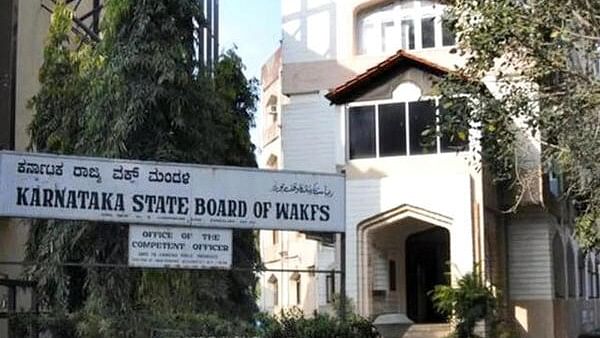
Waqf Board Building, Bengaluru.
Credit: DH Photo
Bengaluru: The All India Muslim Personal Law Board (AIMPLB) has vowed to stage a sit-in protest outside Parliament if the Waqf (Amendment) Bill, 2024, is passed in its current form.
Addressing a news conference here on Monday following the AIMPLB's 29th annual meeting, the board's spokesperson, SQR Ilyas, expressed concerns over the contentious bill and the process followed in drafting it.
According to him, this is the first amendment to the Waqf Act that was drafted without holding consultations with the Muslim community. He emphasised that the Waqf Act underwent significant amendments in 1954, 1995, and 2013, only after extensive consultations with the stakeholders.
"If the state has decided to create lawlessness, who can prevent it," he added.
Ilyas said that the board also opposed the way the Joint Parliamentary Committee (JPC) was going forward with discussions regarding the bill. "The JPC, which was formed to seek suggestions of stakeholders, is consulting irrelevant people who have no locus standi,” he stated.
The board official sought to refute claims in the media that the Waqf Act enjoys special powers and that waqf boards arbitrarily occupy and declare lands as waqf properties.
Stating that waqf boards cannot encroach upon government lands, he said: "These are the lands of our forefathers who have given their private property for charitable purposes."
Adding that government agencies have encroached upon waqf properties in many places, he said: "There were 123 properties in Delhi alone that had to be returned to the waqf board during Indira Gandhi’s regime, which have still not been returned. There are such lands in several prime locations in every state."
Answering questions about problems with the existing Waqf Act, Ilyas insisted that the law itself had a resolution mechanism. "The issues can be referred to a tribunal, and if one does not accept the decision of the tribunal, there is provision to challenge it in the higher courts," he said.
On Sambhal violence
Referring to the recent Sambhal violence, Ilyas said that despite the Places of Worship (Special Provisions) Act, 1991, in place, "every now and then, we see people claiming 'that masjid was a temple, this masjid was a temple’."
He also condemned the killing of three protestors by UP police and said such a disruption of order should have been handled in a better way.
Ilyas said the board would file a PIL petition next month in the Nainital High Court to challenge the Uniform Civil Code of Uttarakhand Act, 2024. "In a country which is so culturally diverse, how can all the people be tied with one law," he asked.
The board demanded that the government introduce a blasphemy legislation banning insults to all religious and sacred personalities irrespective of their religion.